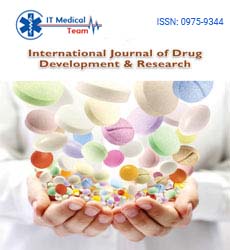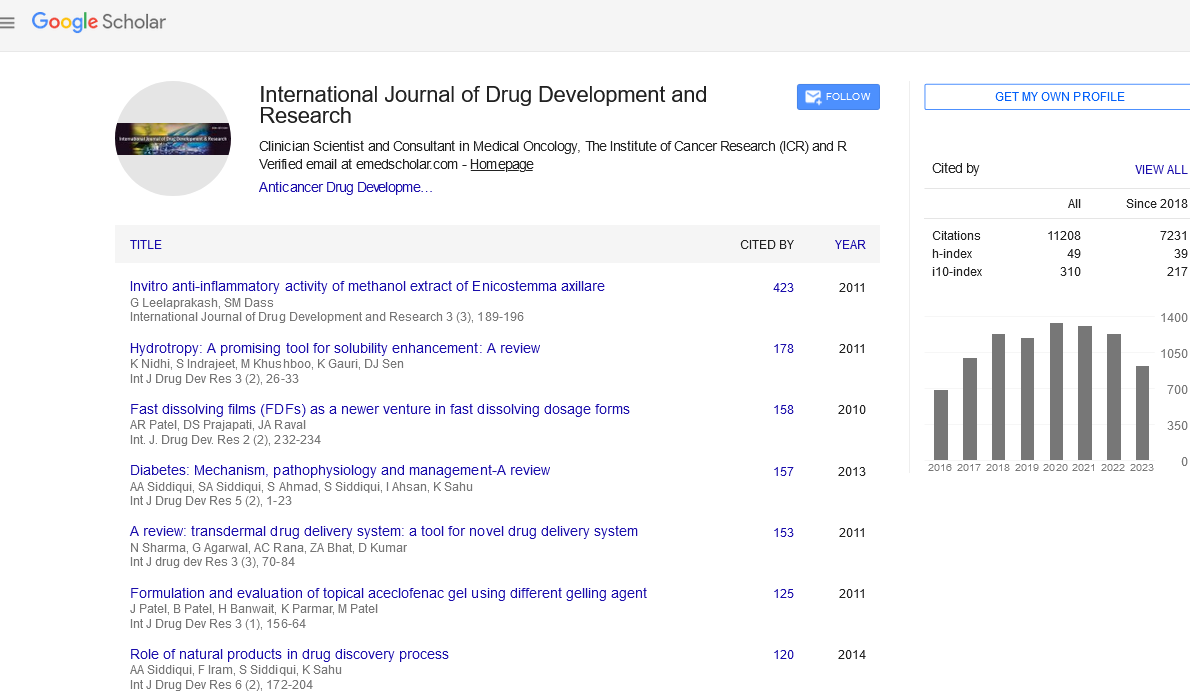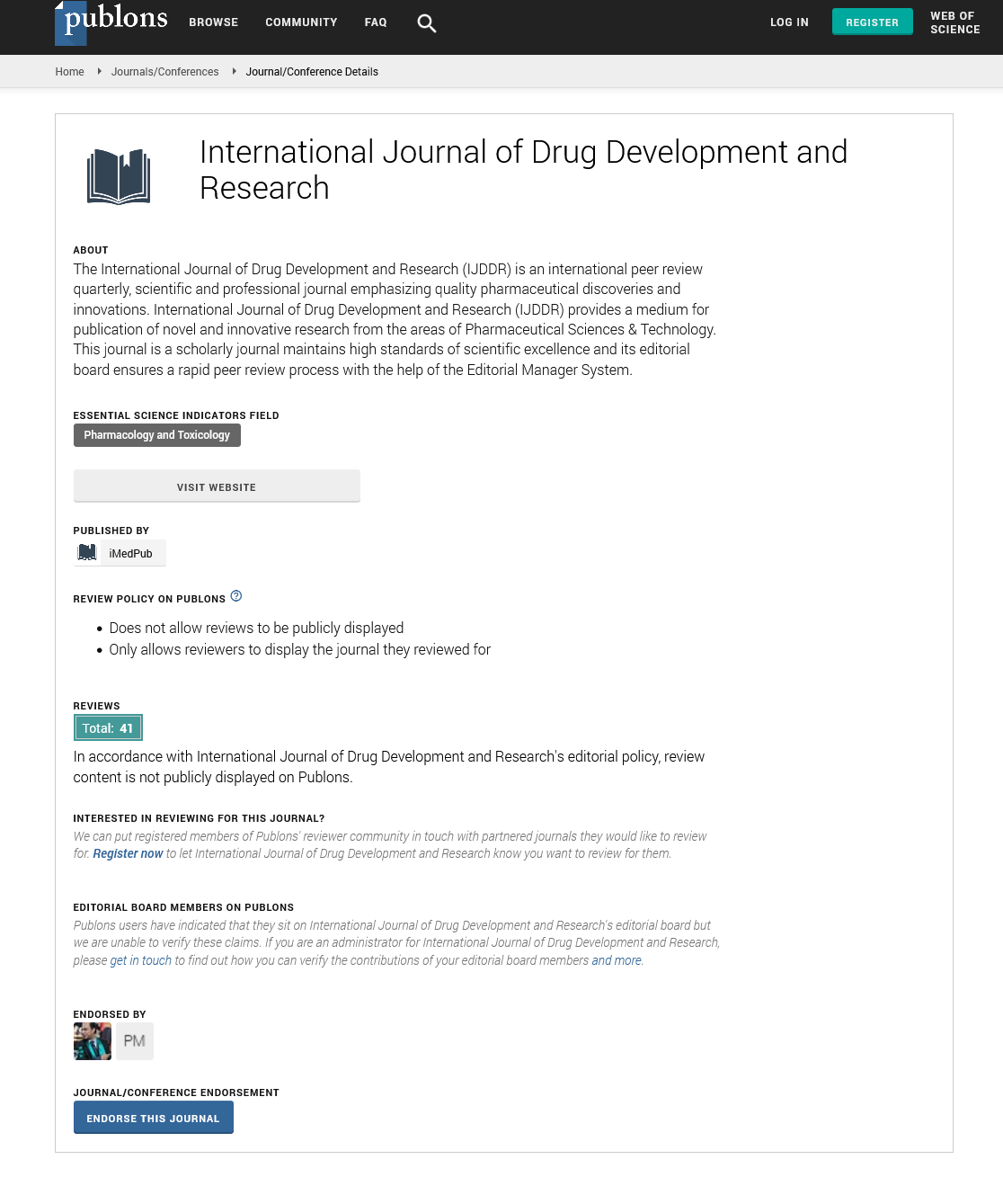Stefania Schiavone1*, Logos Curtis2 and Luigia Trabace1
1Department of Clinical and Experimental Medicine, University of Foggia, Foggia, Italy
2Department of Mental Health and Psychiatry, Young Adult Psychiatry Unit, Geneva University Hospitals, Geneva, Switzerland
*Corresponding Author:
Stefania Schiavone
Department of Clinical and Experimental Medicine, University of Foggia, Via Napoli 20, 71122 Foggia, Italy
Tel: +390881588056
E-mail: stefania.schiavone@unifg.it
Received April 18, 2016; Accepted April 24, 2016; Published April 28, 2016
Citation: Schiavone S, Curtis L, Trabace L (2016) A Short Commentary on the Recent Published Paper: “A Systematic Review on Medication Errors”. Int J Drug Dev & Res 8: 006
In their interesting paper entitled “A systematic Review on Medication Errors”, Karthikeyan et al. performed a systematic literature review about medication errors in prescribing, transcribing, dispensing, administrating and documenting, in order to identify the main contributory factors involved. Given the heterogeneity of the studies they considered, they did not statistically pool the data, but qualitatively analysed according to the type of medication errors, dividing them in Prescribers Errors, Nursing Errors and Pharmacist Errors.
Among all the medical domains affected by the higher rates of medication errors, the psychiatric field is certainly one of the more significant. Nevertheless, our comprehension of medication errors in psychiatry appears still clearly insufficient, given the impact of multifactorial aspects related to patient population, care givers as well as some distinctive psychiatric procedures, such as forcible medication administration. The identification of what should be really considered as a medication error in psychiatry is also less formally defined than in general medicine. Interestingly, the stated rates of medication error in mental health cares largely differ within the various available literature reports, mirroring essentially the multiplicity of in- and outpatient settings, such as patient’s education and therapeutic adherence in terms of his/her own understanding of the prescribed treatment, errors or intention in taking more or less medication than prescribed, decision to stop treatment for specific periods, failure or neglect to notify psychiatrist about further medications appointed by the general practitioner and vice versa, self-medication with natural remedies, association of prescribed medications with various drugs of abuse as well as violent or agitated behaviour [1,2]. However, it should be highlighted that, although the number of patient-related factors that contribute to medication errors in psychiatry is undoubtedly significant, the majority of them are imputable to care providers especially to psychiatrists’ lack of knowledge about pharmacology, transcription of medication orders, treatment dispensing and administration, medication discrepancies between different healthcare settings, such as acute and long-term care facilities [3]. Another crucial aspect which should be considered in the context of medication errors in psychiatry is the use of polytherapy and off-label prescription, in particular in regard to antipsychotic medication [4,5]. The incidence of antipsychotic polytherapy has clearly been increasing in the last decades, raising a medium value of 10% of the psychiatric patients included in different retrospective analysis, focused on oral antipsychotic medication use. With respect to the prevalence of polypharmacy in psychiatry, although hard to measure, it varies between 13 and 90% [6]. Moreover, psychiatrists commonly prescribe antipsychotic medication differently from the recommendations described in the information pamphlet, in particular with respect to dosage (33% of incidence of dosage prescription outside the reported therapeutic range). This off-label use of antipsychotic medication regards mainly younger male patients who commonly receive above-range dosages and female older patients who are more frequently prescribed below-range dosages of antipsychotics [7,8]. Finally, given the particularly fragile nature of treatment adherence in psychiatry [9], a further factor is “treatment compromise” between psychiatrists and their patients: in order to succeed in establishing with them a therapeutic alliance and aiming, in particular, for the best patient’s adherence to psychiatric cares, a certain number of clinical treatment prescriptions may be adjusted to be “acceptable” to the point of being considered as medication errors.
Further efforts and more focused strategies would be necessary to minimize the percentage of medication errors in the psychiatric setting, including a deeper communication and knowledge transfer between psychiatrists and pharmacologists, as well as constant education, training and update programs for psychiatrists, focused, in particular, on the new pharmacological compounds proposed for the treatment of psychiatric disorders.
9482
References
- Naples JG, Hanlon JT, Schmader KE, Semla TP (2016) Recent Literature on Medication Errors and Adverse Drug Events in Older Adults.J Am Geriatr Soc 64:401-408.
- Procyshyn RM, Barr AM, Brickell T, Honer WG (2010) Medication errors in psychiatry: a comprehensive review. CNS Drugs 24:595-609.
- Keers RN, Williams SD, Vattakatuchery JJ, Brown P, Miller J, et al. (2015) Medication safety at the interface: evaluating risks associated with discharge prescriptions from mental health hospitals. J Clin Pharm Ther 40:645-654.
- Kroken RA, Johnsen E (2012) Is rational antipsychotic polytherapy feasible? A selective review. Curr Psychiatry Rep 14:244-251.
- Procyshyn RM, Honer WG, Wu TK, Ko RW, McIsaac SA, et al. (2010) J Persistent antipsychotic polypharmacy and excessive dosing in the community psychiatric treatment setting: a review of medication profiles in 435 Canadian outpatients. Clin Psychiatry 71:566-573.
- Kukreja S, Kalra G, Shah N, Shrivastava A (2013) Polypharmacy in psychiatry: A review. 11: 82-99.
- Maher AR, Theodore G (2012) Summary of the comparative effectiveness reviews on off-label use of atypical antipsychotics. J Manag Care Pharm 18: S1-20
- Maglione M, Maher AR, Hu J, Wang Z, Shanman R, et al. (2011) Off-Label Use of Atypical Antipsychotics: An Update. Rockville (MD): Agency for Healthcare Research and Quality (USA).
- Leo RJ, Jassal K, Bakhai YD (2005) Nonadherence with psychopharmacologic treatment among psychiatric patients. Primary Psychiatry 12: 33-39.






